With the growing variety of vegetarian faux-meats like bacon, sausages and an ever-expanding variety of vegetarian cookbooks and restaurants, vegetarianism has taken the world by storm.
There are variety of reasons to be a vegetarin. Here are top 10 reasons to give vegetarian eating a try.
 1. Helping Animals Also Helps the Global Poor
1. Helping Animals Also Helps the Global Poor
While there is plenty and justified moral indignation about the diversion of 100 million tons of grain for biofuels, more than seven times as much (760 million tons) is fed to farmed animals so that people can eat meat. Is the diversion of crops to our cars a moral issue? Yes, but it’s about one-eighth the issue that meat-eating is. Care about global poverty? Try vegetarianism.
2. Eating Meat Supports Cruelty to Animals
The green pastures and idyllic barnyard scenes of years past are now distant memories. On today’s factory farms, animals are crammed by the thousands into filthy windowless sheds, wire cages, gestation crates, and other confinement systems. These animals will never raise families, root in the soil, build nests, or do anything else that is natural and important to them. They won’t even get to feel the warmth of the sun on their backs or breathe fresh air until the day they are loaded onto trucks bound for slaughter.
3. Eating Meat Is Bad for the Environment
A recent United Nations report entitled Livestock’s Long Shadowconcludes that eating meat is “one of the … most significant contributors to the most serious environmental problems, at every scale from local to global.” In just one example, eating meat causes almost 40 percent more greenhouse-gas emissions than all the cars, trucks, and planes in the world combined. The report concludes that the meat industry “should be a major policy focus when dealing with problems of land degradation, climate change and air pollution, water shortage and water pollution, and loss of biodiversity.”
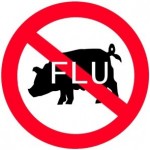 4. Avoid Bird Flu
4. Avoid Bird Flu
The World Health Organization says that if the avian flu virus mutates, it could be caught simply by eating undercooked chicken flesh or eggs, eating food prepared on the same cutting board as infected meat or eggs, or even touching eggshells contaminated with the disease. Other problems with factory farming — from foot-and-mouth to SARS — can be avoided with a general shift to a vegetarian diet.
5. If You Wouldn’t Eat a Dog, You Shouldn’t Eat a Chicken
Several recent studies have shown that chickens are bright animals who are able to solve complex problems, demonstrate self-control, and worry about the future. Chickens are smarter than cats and dogsand even do some things that have not yet been seen in mammals other than primates. Dr. Chris Evans, who studies animal behavior and communication at Macquarie University in Australia, says, “As a trick at conferences, I sometimes list these attributes, without mentioning chickens and people think I’m talking about monkeys.”
 6. Heart Disease: Our Number One Killer
6. Heart Disease: Our Number One Killer
Healthy vegetarian diets support a lifetime of good health and provide protection against numerous diseases, including the United States’ three biggest killers: heart disease, cancer, and strokes. Drs. Dean Ornish and Caldwell Esselstyn — two doctors with 100 percent success in preventing and reversing heart disease — have used a vegan diet to accomplish it, as chronicled most recently in Dr. Esselstyn’s Prevent and Reverse Heart Disease, which documents his 100 percent success rate for unclogging people’s arteries and reversing heart disease.
7. Cancer: Our Number Two Killer
Dr. T. Colin Campbell is one of the world’s foremost epidemiological scientists and the director of what The New York Times called “the most comprehensive large study ever undertaken of the relationship between diet and the risk of developing disease.” Dr. Campbell’s best-selling book, The China Study, is a must-read for anyone who is concerned about cancer. To summarize it, Dr. Campbell states, “No chemical carcinogen is nearly so important in causing human cancer as animal protein.”
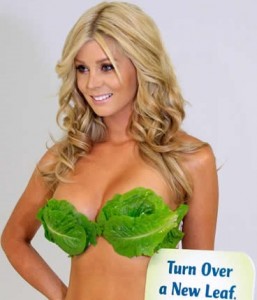 8. Fitting Into That Itty-Bitty Bikini
8. Fitting Into That Itty-Bitty Bikini
Vegetarianism is also the ultimate weight-loss diet, since vegetarians are one-third as likely to be obese as meat-eaters are, and vegans are about one-tenth as likely to be obese. Of course, there are overweight vegans, just as there are skinny meat-eaters. But on average, vegans are 10 to 20 percent lighter than meat-eaters. A vegetarian diet is the only diet that has passed peer review and taken weight off and kept it off.
9. Global Peace
Leo Tolstoy claimed that “vegetarianism is the taproot of humanitarianism.” His point? For people who wish to sow the seeds of peace, we should be eating as peaceful a diet as possible. Eating meat supports killing animals, for no reason other than humans’ acquired taste for animals’ flesh. Great humanitarians from Leo Tolstoy and Mahatma Gandhi to Thich Nhat Hanhhave argued that a vegetarian diet is the only diet for people who want to make the world a kinder place.
10. The Joy of Veggies
As the growing range of vegetarian cookbooksand restaurants shows, vegetarian foods rock. People report that when they adopt a vegetarian diet, their range of foods explodes from a center-of-the-plate meat item to a range of grains, legumes, fruits, and vegetables that they didn’t even know existed.
Sir Paul McCartneysums it all up, “If anyone wants to save the planet, all they have to do is just stop eating meat. That’s the single most important thing you could do. It’s staggering when you think about it. Vegetarianism takes care of so many things in one shot: ecology, famine, cruelty.”
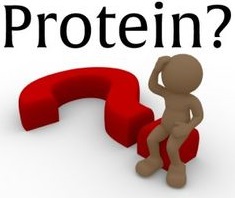 However, though heaps of benefits as a vegan above, some nutrition concerns and health effects of vegetarian diets. Are there any health risks in becoming a vegetarian? Some vegetarains and vegans may be deficient in iron, vitamin B-12, vitamin D, calcium, zinc, and occasionally riboflavin. Do vegetarians get proper nutrition?
However, though heaps of benefits as a vegan above, some nutrition concerns and health effects of vegetarian diets. Are there any health risks in becoming a vegetarian? Some vegetarains and vegans may be deficient in iron, vitamin B-12, vitamin D, calcium, zinc, and occasionally riboflavin. Do vegetarians get proper nutrition?
The key to any healthy diet is to choose a wide variety of foods, and to consume enough calories to meet your energy needs. It is important for vegetarians to pay attention to these five categories in particular.
Protein
Protein is found in both plant foods and animal foods. Vegetarians should be aware that while there are plenty of plant-based protein options, many of these foods contain less protein per serving compared to animal foods. Therefore, combining one or more protein sources at a meal is helpful. Adequate intake with a wide variety of foods from all food groups should fulfill your protein needs. Good sources of protein include lentils, beans, tofu, soybeans (edamame), soy products (veggie burgers, “chik’n” strips, etc), textured vegetable protein (TVP), low-fat dairy products, nuts, seeds, tempeh, and eggs.
Calcium
The AND recommends that adults 19 to 50-years-old consume at least 1000mg of calcium per day — the equivalent of 3 cups of milk or yogurt. Vegetarians can meet their calcium needs if they consume adequate amounts of low-fat and fat-free dairy products such as milk, yogurt, and cheese. Calcium is also found in many plant foods including dark, leafy greens (e.g. spinach, kale, mustard, collard and turnip greens, and bok choy), broccoli, beans, dried figs, and sunflower seeds, as well as in calcium-fortified cereals, cereal bars and some fortified juices.
Vegans (people who don’t eat any animal products) must strive to meet their daily calcium requirements by regularly including these plant sources of calcium in their diets. Many soy milk products are fortified with calcium, but be sure to check the label for this. Although almond milk may also be calcium-fortified, it is lower in protein so soy milk may be a better alternative to dairy. 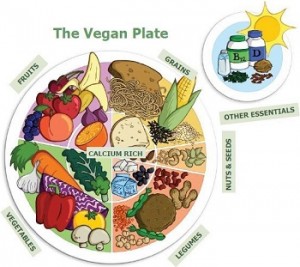
Calcium is best absorbed by the body when it comes from food, so it’s best to include calcium-rich foods in your diet on a regular basis. If these foods are not part of your typical diet, then you may consider a calcium supplement. Look for one that has 500 mg calcium or more per serving AND contains vitamin D. It’s important to take this supplement with a meal, rather than on an empty stomach. Calcium supplements are available at the pharmacy in Health Services.
Vitamin D
Vitamin D helps your body absorb and use calcium. There are few foods that are naturally high in vitamin D, though. Therefore, dairy products in the US are fortified with vitamin D. Many soy milk products are also fortified with vitamin D. Your body can make its own vitamin D, but only when the skin is exposed to adequate sunlight (but that can have its own risks). A person only needs about 10 minutes of sunlight exposure for an adequate dose of vitamin D; then it’s important to apply sunscreen. People who do not consume dairy products and who do not receive direct exposure to sunlight regularly should consider taking supplemental vitamin D. The recommended intake of Vitamin D for college students is 600 international units (IU) per day. Despite research suggesting that higher intakes of vitamin D may be protective against a variety of diseases, intakes above 2000 IU per day can result in vitamin D toxicity. Both multivitamin supplements and calcium supplements with vitamin D are available at the pharmacy in Health Services
Iron
Iron-fortified breads and cereals, dark green vegetables (e.g. spinach and broccoli), dried fruits, prune juice, blackstrap molasses, pumpkin seeds, sesame seeds, and soybean nuts are good plant sources of iron. Consuming foods high in vitamin C, such as citrus fruits or juices, tomatoes, and green peppers helps your body absorb iron from these plant sources. Cooking food in iron pots and pans will also add to your iron intake.
Vitamin B-12
Vitamin B-12 is produced in animals and by bacteria in the soil. Vegetarians who consume dairy products and/or eggs usually get enough B-12 since it is found in these foods. Vegans, however, should add vitamin B-12 fortified soy milk to their diets. Regularly taking a broad-spectrum multivitamin and mineral supplement (available at the pharmacy in Health Services) will also supply the necessary amount of B-12.
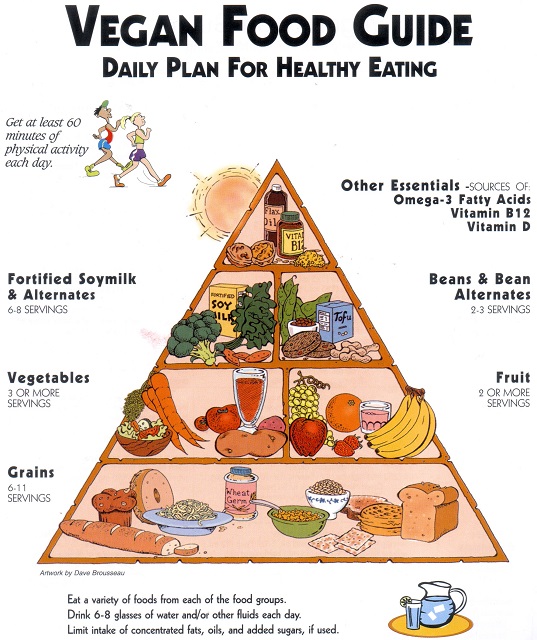 What about athletes?
What about athletes?
Being both an athlete and a vegetarian can be challenging, especially for vegans. It can be difficult to eat a volume of food high enough to meet an athlete’s high caloric needs. Vegetarians who participate in sports should be aware of their increased energy needs, and should make a concerted effort to consume sufficient calories.
What are some options for a tasty vegetarian meal?
Becoming a vegetarian can be as easy as you choose to make it. Whether you enjoy preparing elaborate meals or choose quick and easy ones, vegetarian meals can be very satisfying. In order to make meal preparation easier, the AND suggests having the following foods on hand:
•Ready-to-eat, whole-grain breakfast cereals, and quick-cooking whole-grain cereals such as oatmeal
•Whole-grain breads and crackers, such as rye, whole wheat, and mixed grain
•Other grains such as barley and bulgur wheat
•Canned beans, such as pinto, black beans, and garbanzo beans
•Plant-based proteins like tofu, tempeh, and seitan
•Milk, yogurt, and fortified soy substitutes
•Rice (including brown, wild, etc.)
•Pasta (now available in whole wheat, spinach, and other flavors) with tomato sauce and canned beans and/or chopped veggies
•Corn or flour tortillas
•Vegetarian soups like lentil or minestrone
•Plain frozen vegetables
•Nut spreads (e.g. peanut or almond butter)
•Canned and frozen fruit


